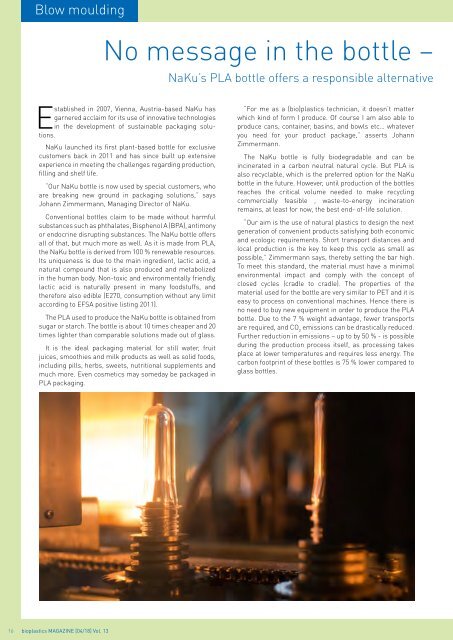Issue 04/2018
bioplasticsMAGAZINE_1804
bioplasticsMAGAZINE_1804
Create successful ePaper yourself
Turn your PDF publications into a flip-book with our unique Google optimized e-Paper software.
Blow moulding<br />
No message in the bottle –<br />
NaKu’s PLA bottle offers a responsible alternative<br />
Established in 2007, Vienna, Austria-based NaKu has<br />
garnered acclaim for its use of innovative technologies<br />
in the development of sustainable packaging solutions.<br />
NaKu launched its first plant-based bottle for exclusive<br />
customers back in 2011 and has since built up extensive<br />
experience in meeting the challenges regarding production,<br />
filling and shelf life.<br />
“Our NaKu bottle is now used by special customers, who<br />
are breaking new ground in packaging solutions,” says<br />
Johann Zimmermann, Managing Director of NaKu.<br />
Conventional bottles claim to be made without harmful<br />
substances such as phthalates, Bisphenol A (BPA), antimony<br />
or endocrine disrupting substances. The NaKu bottle offers<br />
all of that, but much more as well. As it is made from PLA,<br />
the NaKu bottle is derived from 100 % renewable resources.<br />
Its uniqueness is due to the main ingredient, lactic acid, a<br />
natural compound that is also produced and metabolized<br />
in the human body. Non-toxic and environmentally friendly,<br />
lactic acid is naturally present in many foodstuffs, and<br />
therefore also edible (E270, consumption without any limit<br />
according to EFSA positive listing 2011).<br />
The PLA used to produce the NaKu bottle is obtained from<br />
sugar or starch. The bottle is about 10 times cheaper and 20<br />
times lighter than comparable solutions made out of glass.<br />
It is the ideal packaging material for still water, fruit<br />
juices, smoothies and milk products as well as solid foods,<br />
including pills, herbs, sweets, nutritional supplements and<br />
much more. Even cosmetics may someday be packaged in<br />
PLA packaging.<br />
“For me as a (bio)plastics technician, it doesn’t matter<br />
which kind of form I produce. Of course I am also able to<br />
produce cans, container, basins, and bowls etc… whatever<br />
you need for your product package,” asserts Johann<br />
Zimmermann.<br />
The NaKu bottle is fully biodegradable and can be<br />
incinerated in a carbon neutral natural cycle. But PLA is<br />
also recyclable, which is the preferred option for the NaKu<br />
bottle in the future. However, until production of the bottles<br />
reaches the critical volume needed to make recycling<br />
commercially feasible , waste-to-energy incineration<br />
remains, at least for now, the best end- of-life solution.<br />
“Our aim is the use of natural plastics to design the next<br />
generation of convenient products satisfying both economic<br />
and ecologic requirements. Short transport distances and<br />
local production is the key to keep this cycle as small as<br />
possible,” Zimmermann says, thereby setting the bar high.<br />
To meet this standard, the material must have a minimal<br />
environmental impact and comply with the concept of<br />
closed cycles (cradle to cradle). The properties of the<br />
material used for the bottle are very similar to PET and it is<br />
easy to process on conventional machines. Hence there is<br />
no need to buy new equipment in order to produce the PLA<br />
bottle. Due to the 7 % weight advantage, fewer transports<br />
are required, and CO 2<br />
emissions can be drastically reduced.<br />
Further reduction in emissions – up to by 50 % - is possible<br />
during the production process itself, as processing takes<br />
place at lower temperatures and requires less energy. The<br />
carbon footprint of these bottles is 75 % lower compared to<br />
glass bottles.<br />
16 bioplastics MAGAZINE [<strong>04</strong>/18] Vol. 13


















